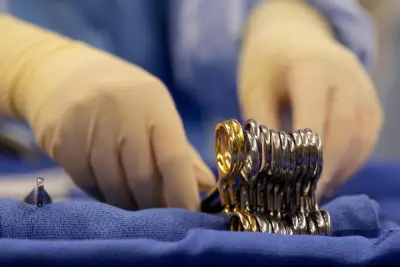US organ donation system faces scrutiny and changes after reports of disturbing near-misses

By LAURAN NEERGAARD WASHINGTON AP The U S is progressing new safeguards for the organ transplant system after a administration analysis ascertained a Kentucky group continued preparations for organ donation by various patients who proved signs of life officers explained Congress Tuesday Related Articles OpenAI s Sam Altman warns of AI voice fraud situation in banking Family supporters urge release of Spanish-language journalist in ICE custody Smoking or oxygen machine issue may have caused deadly fire at Massachusetts assisted-living home Video shows Florida deputies punching and dragging a Black man from his car Ozzy Osbourne who led Black Sabbath and became the godfather of heavy metal dies at While the organ removals were canceled near misses that specific lawmakers called horrifying should never happen A House subcommittee sought how to repair trust in the transplant configuration for expected organ donors and families particular of whom have opted out of donor registries after these cases were publicized We have to get this right commented Rep Brett Guthrie a Kentucky Republican who chairs the Ability and Commerce Committee and whose mother died waiting for a liver transplant Hopefully people will walk away in the modern day knowing we need to address issues but still confident that they can give life Guthrie explained adding that he will remain a registered organ donor The hearing came after a federal inspection began last fall into charges that a Kentucky donation group pressured a hospital in to proceed with plans to withdraw life promotion and retrieve organs from a man despite signs that he might be waking up from his drug overdose That surgery never happened after a practitioner noticed him moving and moaning while being transported to the operating room and the man survived Lawmakers stressed greater part organ donations proceed appropriately and save tens of thousands of lives a year But the federal probe concluded in March but only made citizens ahead of Tuesday s hearing cited a concerning pattern of exposure in dozens of other cases involving the Kentucky group s initial planning to recover someone s organs The account commented specific should have been stopped or reassessed earlier and mostly involved small or rural hospitals with less experience in caring for foreseen organ donors The Kentucky organ procurement organization or OPO has made changes and the national transplant infrastructure is working on additional initiatives But notably absent Tuesday was any testimony from hospitals whose doctors must independently determine a person is dead before donation groups are allowed to retrieve organs Here s a look at how the nation s transplant system works There s a dire need for organ donation More than people are on the U S transplant list and about a day die waiting according to the Organ Procurement and Transplantation Arrangement Only about of deaths occur in a way that allows someone to even be considered for organ donation The majority people declared dead in a hospital will fast be transferred to a funeral home or morgue instead How the U S organ transplant system is set up Several groups are involved in every transplant the hospital caring for someone dead or dying the OPOs that coordinate recovery of organs and help match them to patients on the waiting list and transplant centers that decide if an organ is the right fit for their patients Adding to the complexity two administration agencies HRSA the Healthcare Materials and Services Administration and the Centers for Medicare and Medicaid Services share regulatory oversight of different parts of the donation and transplant process How deceased donation works Preponderance organ donors are brain-dead when testing determines someone has no brain function after a catastrophic injury The body is left on a ventilator to patronage the organs until they can be retrieved But increasingly organs are donated after circulatory death called DCD when people die because their heart stops It usually happens when doctors determine someone has a nonsurvivable injury and the family withdraws life backing Donation groups don t provide hands-on individual care Hospitals are required to alert their area OPO to every feasible donor who is declared brain-dead or once the decision to withdraw life assistance is made The OPOs by law can t participate in that decision and we are not even in the room at that time explained Barry Massa of Kentucky s Grid for Hope During the following days of preparation hospital employees continue caring for the recipient while the donation unit talks with the family about the process gathers hospital records showing the person is eligible requests tests of organ quality and make arrangements with transplant centers to use them Once the hospital withdraws life sponsorship and the heart stops beating there s a mandatory wait five minutes to be sure it won t restart When the medical expert declares death the organ retrieval process can begin Organs are only considered usable if death occurs relatively rapidly usually up to about two hours Sometimes that takes much longer and thus the organs can t be used and HRSA s Dr Raymond Lynch reported Congress that doesn t necessarily mean anything was done wrong Still he reported HRSA is reviewing reports of feasible mistakes elsewhere This is a technically demanding form of care that requires good collaboration between the OPO and the hospital he mentioned What happens next At issue is how doctors are sure when it s time to withdraw life aid from a dying individual and the delicate balance of how OPOs interact with hospital staff in preparing for donation once death occurs In May HRSA quietly ordered the U S transplant grid to oversee improvements at the Kentucky OPO and to develop new national policies making clear that anyone family hospital staff or organ donation staff can call for a pause in donation preparations any time there are concerns about the individual s eligibility Lynch explained the regime now wants more proactive collaboration from OPOs to give hospital staff a clear understanding of when to at least temporarily halt and reevaluate a feasible donor if their wellbeing status changes Kentucky s Massa commented his group only received HRSA s reports this week but that after learning about last fall s accusations it made a few changes Massa stated every hospital practitioner and nurse now gets a checklist on caring for prospective donors and how to pause when concerns are raised and anyone can anonymously assessment complaints The Associated Press Wellbeing and Science Department receives patronage from the Howard Hughes Biological Institute s Department of Science Schooling and the Robert Wood Johnson Foundation The AP is solely responsible for all content
